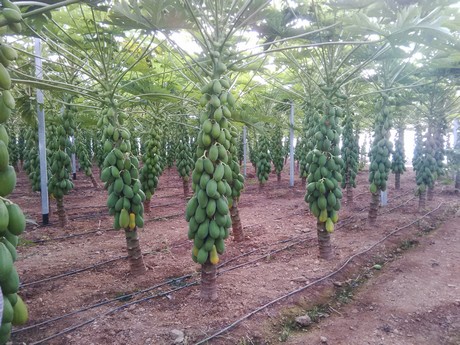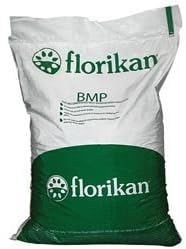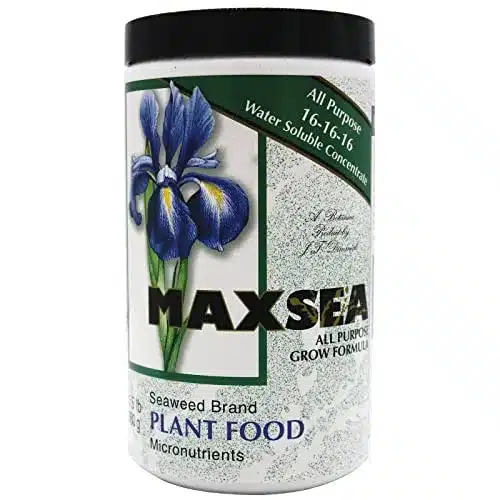Like most tree crops, papaya trees can suffer from nutrient deficiencies, leading to many problems. Papaya trees require essential nutrients, primarily Nitrogen, Phosphorus, and Potassium, for good growth and bountiful fruit production. In addition to these essential nutrient elements are trace elements like calcium, magnesium, and zinc. The latter are required in minute quantities; in fact, they are present in most fertilizers.
Usually, the nutrients are present, or let me say they are present in form of fertilizers. The best way to describe this is that fertilizers supply papaya trees with the required nutrients. This will lead us to the most recommended fertilizers for papaya trees. The compost fertilizer and the NPK fertilizers are the best fertilizers for papaya. The difference between these two fertilizers is the source of the nutrient present in them.

Compost is made from organic materials such as animal waste, leaves, grass clippings, and kitchen scraps. It is also called organic soil amendment. The best kinds of compost are made from manure or other animal wastes (like chicken litter); these materials are rich in nitrogen.
Compost contains a high level of organic matter, making it a safe, chemical-free solution for papaya trees and other garden crops. Compost is an excellent choice because it not only feeds the papaya tree with nitrogen but also improves the soil acidity, structure, aeration, and creates moist, rich soil.
Compost can be added to the soil during land preparation; it is effective when incorporated into the soil. Compost can also be applied to growing papaya trees as top-dressing. As the papaya tree grows, it can be used as mulch for a steady supply of nutrients.
NPK Fertilizer: 10:10:10 or 14:14:14
The NPK fertilizers are specially formulated to contain Nitrogen, Phosphorus, and Potassium in different or similar proportions. NPK fertilizers are not organic; they are made from synthetic materials in the laboratory.
The best NPK fertilizers for papaya trees are NPK 10:10:10 and 14-14-14; they contain an equal proportion of nitrogen, phosphorus, and potassium. It’s also a good choice for the first year of fertilizer. When buying any of these balanced fertilizers, ensure you check the label and the expiry date.
The advantage of compost fertilizer over NPK fertilizers is that composts are slow-release fertilizers. They can stay in the soil for a very long time to supply steady nutrients to papaya trees. On the other hand, NPK fertilizers release nutrients faster for quick usage. NPK fertilizers are commonly used to treat nutritional deficiencies in papaya trees.
Whilst I have provided the basic information about the usage of the NPK fertilizers, I want to recommend some NPK fertilizers for papaya tree; these fertilizers contain the required nutrients in adequate proportions. These fertilizers are:
- Florikan 14-14-14 Plus Fertilizer, 50 lb – 3 to 4 Months
- Maxsea All Purpose 1.5lb (16-16-16)
- FoxFarm Marine Cuisine Dry Fertilizer 4lb 10-7-7
- Gardenera Premium Papaya Potting Mix
- Potassium Sulfate Plant Fertilizer 0-0-50 5lbs
- Miracle-Gro Citrus, Avocado, Mango Plant Food, 4.5 lbs
- MicroLife Citrus & Fruit Fertilizer, 40 LBS
- Avocado and Citrus Tree Fertilizer with Seaweed and Iron

1. Florikan 14-14-14 Plus Fertilizer, 50 lb – 3 to 4 Months
- Intended for greenhouse crops, but can be used on papaya, citrus, avocado, and all other types of plants
- 100% polymer-coated fertilizer with Florikote technology
- Recommended for growers growing fruit crops like papaya.
- Should be used with a micronutrient package when possible
- Controlled release fertilizer activated by moisture
- Release speed affected by soil temperature
- Consistent and long-lasting nutrient release without dumping
- Nutrient release not affected by media type or pH
- Patented dual reactive layer polymer coating process
- Ideal for incorporation with growing media or as a topdressing

2. Maxsea All Purpose 1.5lb (16-16-16)
- Made from a blend of North Atlantic seaweed and primary plant foods
- Water-soluble nutrients for immediate absorption
- Promotes vigorous plant growth with dark green foliage, quality blossoms, and abundant fruit crops and vegetables
- Completely balanced formula with nitrogen, phosphorus, and potassium
- Contains a full spectrum of secondary elements and micronutrients
- Can be combined with other Maxsea products for customized formulas

3. FoxFarm Marine Cuisine Dry Fertilizer 4lb 10-7-7
- 4-pound marine cuisine seafood time release fertilizer
- Organic and mineral-based nutrients
- Balanced diet for outdoor plants
- Encourages beneficial microbe populations
- Helps soil defend against harmful nematodes
- Contains 10% nitrogen, 7% phosphorus, and 7% potassium
4. Gardenera Premium Papaya Potting Mix
- Meticulously formulated blend of premium ingredients
- Features Canadian Peat Moss, Worm Castings, Coco Coir, and Perlite
- Designed to provide an ideal growth medium for Papaya plants
- Encourages robust growth and showcases tropical beauty
- Ensures consistent moisture retention and healthy root development
- Stimulates vigorous root growth and overall plant vitality
- Enhances moisture distribution and root aeration
- Lightweight inclusion for optimal aeration
- Offers versatility for indoor and outdoor Papaya plants
- Superior moisture retention, efficient drainage, and nutrient enrichment

5. Southern Ag Sulfate of Potash Plant Fertilizer 0-0-50 5lbs
- High-quality potassium sulfate fertilizer for fruit-brearing trees like citrus, papaya, avocado, coconut, and others.
- pH-neutral source of essential potassium and sulfur nutrients
- Water-soluble powder form for easy absorption
- Supports flowering, fruiting, and overall plant health
- Organic formulation suitable for organic production
- Balanced nutrient profile for vibrant, productive plants

6. Miracle-Gro Citrus, Avocado, Mango Plant Food, 4.5 lbs
- Feeds papaya trees for up to 3 months
- Contains added potassium, magnesium, sulfur, and iron
- Nourishes above and below the soil
- Supports root strength and development
- Increases water efficiency
- Suitable for citrus, avocado, and mango plants
- Can be used in-ground or in containers
- Contains added potassium, magnesium, sulfur, and iron
- Microbes break down compost into nutrients
- Can be applied by shaking onto soil or mixing into soil
- Reapply every 3 months for best results

7. MicroLife Citrus & Fruit Fertilizer, 40 LBS
- Contains over 100 + nutrients, minerals, vitamins, natural plant hormones, natural plant stimulators, essential sugars/amino acids/carbon/ protein, and billions of beneficial
- Designed for all citrus and fruit trees
- Completely natural and 100% organic
- Slow release, 2% iron, will not burn, and is easy to use
- Promotes larger root systems and enhances plant health
- Manufactured for over 30 years by MicroLife
- Ingredients include Fish, Kelp, Emery Humates, Molasses, Rock Phosphate, Wheat Middling’s’, Soy Meal, Cottonseed Meal, Alfalfa, Corn Meal, Kmag, Potassium Sulfate, Iron Sulfate, 18 select Amino Acids, Folic Acid, Vitamins, and the MicroGro Supreme Bio-Inoculant package
- Favored by organic growers, co-ops, landscape professionals, and universities

8. Gardenwise Avocado and Citrus Tree Fertilizer with Seaweed and Iron
- 6-4-6 Citrus and Avocado Professional Fertilizer
- Contains 6% nitrogen, 4% phosphorus, and 6% potassium
- Easy to use, simply sprinkle around trees or mix into soil
- Balanced blend of Nitrogen, Phosphorus, and Potassium
- Specifically formulated for citrus fruits, avocado trees, papaya trees, coconut trees, and other tree crops
- Enriched with seaweed extract for added nutrients
- Suitable for all types of gardens and plants
How To Fertilize Papaya Trees
Applying fertilizers to papaya trees, in the right quality and adequate quantity, at the right time, can make a huge difference in the growth and fruit yield.
Regular fertilization of papaya trees with fertilizers like NPK 10-10-10 or 14-14-14 fertilizer is essential to ensure the trees do not show any sign of nutrient deficiency and get the required nutrients always. You can fertilize the papaya trees using different fertilizer application methods.
The broadcasting method is ideal for papaya seedlings in the nursery. It involves spreading the fertilizer evenly in the nursery. It is usually recommended that when fertilizer is applied through broadcasting, watering should follow to drop off the fertilizer granules on the papaya leaves.
At transplanting, applying compost fertilizer through the band placement method of fertilizer application is most desired. This allows individual papaya plants to get the recommended dose of fertilizer. This way, competition between two or more papaya trees is eliminated, and the tree has an optimum use of the fertilizer.
Fertilizer is best applied to established or growing papaya trees through top dressing (with compost). This is best for applying compost and any other organic manure. Fertilizing papaya trees through top dressing helps to retain moisture, improve the soil ecosystem, and control weeds at the root of the tree.
Regarding the dose of the NPK fertilizer for papaya trees, I recommend you follow the assigned dosage by the manufacturer of the fertilizer. Most of the dosage instructions found online are incorrect and can harm your papaya tree. Check the fertilizer label for the recommended dosage. Compost can be applied indiscriminately; it is safe for the papaya trees as well as the environment.
FAQs About Papaya Tree Fertilizer
Is chicken manure good for papaya trees?
Yes. Chicken manure is an excellent fertilizer for papayas because it’s rich in nitrogen, phosphorus, calcium, and calcium. Only decayed chicken manure can be applied to papaya trees. These fertilizer helps provide primary nutrients as well as improve the soil structure.
Is Epsom salt good for papaya trees?
Epsom salt can be applied to papaya trees. It contains magnesium, sulfur, and oxygen. Epsom salt has been used for many years as a plant growth supplement; however, there are limits on how much you should use to reap the full benefits from this nutrient source without damaging your plants or soil.
How often do you fertilize papaya?
The number of times you fertilize papaya depends on the type of fertilizer used. Organic fertilizers like manure and compost can be applied monthly, while the NPK 14:14:14 fertilizer can be applied at the beginning of every growth phase.
Regular application of NPK 14:14:14 fertilizer can cause acidification of the soil and leaching of nutrients into the water bodies, hence, this synthetic fertilizer should be applied only when needed. Usually, tree crops like papaya prefer organic fertilizers like animal waste and compost; organic fertilizers stay longer in the soil, they improve the soil fertility and soil structure.
Related: How To Make Liquid Organic Fertilizer For Plants
Does the papaya tree need a lot of water?
Watering is essential to all tree crops. Papaya tree needs a lot of water, particularly at the seedling and vegetative growth stages. Watering should be done twice daily, early in the morning and late in the evening.
If you want to make sure your papaya tree is getting enough water without wasting any, try using the smart sprinklers. They’ll automatically adjust their irrigation schedule based on how much rain has fallen in recent weeks (or years).
The last thing worth mentioning here is how important it is not to get too carried away with watering, either during the summer months or the winter months. If you see signs of yellowing leaves or wilting results, then cut back immediately; this indicates overwatering.
Are eggshells good for papaya trees?
Eggshells are indeed good for papaya trees. An eggshell contains calcium and phosphorus; these are important nutrients required by papaya for good growth. Calcium helps in strengthening cell walls, while potassium helps in fruit growth. Adding eggshells to compost will greatly fortify the soil.
Related: Effects Of Eggshells On Tomato Plant Growth And Garden Soil
Lastly, when fertilizing the papaya tree, you should follow the following tips:
- Apply fertilizers early in the morning or late at night when temperatures are cooler.
- Water the trees immediately after applying fertilizer.
You can make your compost at home or buy it from an experienced gardener. Also, ensure you buy your fertilizer from a reputable online agro store. If you have any questions about fertilizing your papaya tree, please leave a comment below.
Duly tested Bio Enriched Organic Manure “Annapurna” of M/s Multiplex Bio-Tech Pvt Ltd, Bangalore is best organic manure for all crops (includes field crops, orchards, fruits and vegetables).
Is cow manure and mushroom compost good for my fruit trees and vegetable garden?
Yes
Pls how many feet off the plant should one apply the fertilizer ?
Again, pls how do I work on my soursop trees for them to give gud yield ?
20cm ring formation will suffice. Apply manure to your soursop
How do I deal with papaya pests
Very impressed with the irrigation infrastructure. Would like to do the same. Advise on where to get the service and a farm manager…
What is the best way to plant pawspaws?
Raise the seeds in a nursery and transplant them to the field after germination.
Make a harrowing potion then spread the seeds,cover the seeds with sprinkle sand,then cover the potion with mature and finally sprinkle water at least ones daily until it’s time for transplantation.It will produce both Male & Female depending on your luck.
Please help me to obtain some papaya seeds.victor nyaoro is my name.
Send a mail admin@justagric.com
Thanks for the information
Is chicken manure good for papaya trees?
Is triple 14 enough fertilizer fir papaya? Or plus urea?
Chicken manure is good because it serves the papaya tree for a longer period compared to urea or any other synthetic fertiliser with short period of action. Aside from that, chicken manure enhances your soil condition, making it better for planting and safer for the ecosystem. I hope this helps.
Where are you located
.Have several papaya plants. Common problems faced…. fruits form but drop offed with the leaves. What should I do? TQ
Excellent
How to fertilize papaya trees
Composting papaya trees give better yield than chemical base fertilisers.
Absolutely. You are very correct.
Salam
I have purchased 2 papaya plants before winter which were 4feet almost now its summer and they grew 6 feet and big leaves but still no flowering
Temp is nearly 35 to 40C
whats the problem?